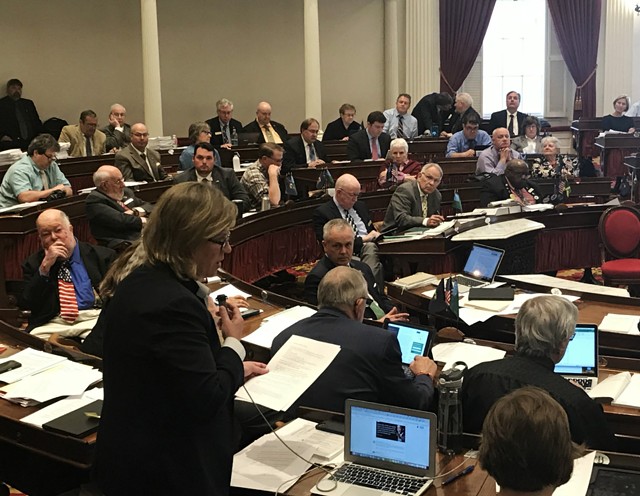
- Taylor Dobbs
- Rep. Heidi Scheuermann (R-Stowe) arguing against the minimum wage bill
The Vermont House narrowly approved a bill Tuesday that would raise the state’s minimum wage to $15 per hour by the beginning of 2024.
The 77-69 vote came after a daylong debate that hinged on whether the minimum wage increase would help or hurt Vermont's lowest-paid workers.
“We must have the courage to tilt the playing field, the smallest amount, as slowly as possible” in favor of low-income workers, said Rep. Tom Stevens (D-Waterbury).
Stevens and other proponents of the legislation,
S.40, argued that the increased labor costs for businesses would be offset by increased consumer spending and savings from a drop in the high employee turnover rates typical in low-wage jobs.
“We all know the old saying that a rising tide lifts all boats,” said Rep. Robin Chesnut-Tangerman (P–Middletown Springs), adding that he supports the legislation based on “the idea that when others do better, we do better as a whole.”
Other lawmakers, in speeches on the House floor, tried to persuade their colleagues in moral terms.
“I know you can find statistics that bolster any argument,” said Rep. Valerie Stuart (D-Brattleboro), “but my argument is this is the right thing to do and this is the time to do it.”
Opponents of the bill spoke in support of low-income families but said an increased minimum wage is not the best way to help.
“I’m very concerned it will hurt many of the people it’s intended to help,” said Rep. Cynthia Browning (D-Arlington).
Browning and others suggested that the increased labor costs would lead businesses to cut jobs or benefits, leaving low-income Vermonters in even worse positions.
Rep. Heidi Scheuermann (R-Stowe) warned that the state would lose businesses if the legislation ultimately passes.
“In some cases, there will be a reduction in force, reduced hours and reduced benefits … and in several cases ... doors will close.”
The Senate passed a version of the bill in February that would raise the minimum wage to $15 by 2022. Before the bill can advance to the governor, the Senate must either accept the slower House timeline or the two chambers will establish a conference committee to agree on a compromise.
The House is expected to take a final vote on the bill Wednesday before it returns to the Senate.
















Comments
Comments are closed.
From 2014-2020, Seven Days allowed readers to comment on all stories posted on our website. While we've appreciated the suggestions and insights, right now Seven Days is prioritizing our core mission — producing high-quality, responsible local journalism — over moderating online debates between readers.
To criticize, correct or praise our reporting, please send us a letter to the editor or send us a tip. We’ll check it out and report the results.
Online comments may return when we have better tech tools for managing them. Thanks for reading.